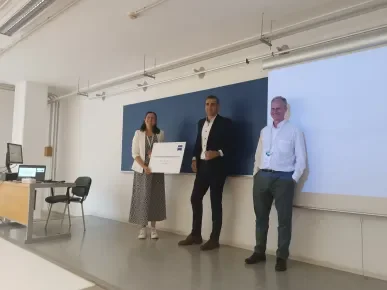María Barra receives the Nanolito award for her Doctoral Thesis
The Spanish Nanolithography Network awards the Nanolito prize to Maria Barra for her thesis entitled Micro and Nano Fabrication of Structures for Light-Matter Interaction.

The diplomas accrediting the Nanolito Doctoral Thesis Awards have been presented at the XXXIX Biennial of the Royal Spanish Society of Physics (RSEF), which is being held these days in Donostia San Sebastian. These awards seek to highlight the contribution of young scientists to the fields of nanolithography and nanofabrication, specifically those who have recently defended their doctoral thesis in Spain.
María Barra studied Physics at the University of Zaragoza and in 2018 joined nanoGUNE as a researcher to develop a PhD thesis with the Nanooptics and Nanodevices groups, under the direction of Rainer Hillenbrand and Luis Hueso. She obtained funding from the Spanish Government through an FPI grant.
In the development of this work they designed experiments that, through the use of advanced fabrication techniques, have successfully solved some current challenges related to materials science, especially to light-matter interaction. This thesis demonstrates that only through detailed knowledge and precise control of all parameters can samples and devices be prepared with the necessary quality to address the issues raised.
Several works and contributions to projects have been carried out due to the general and collaborative nature of the thesis. Specific protocols adapted to the project and the requirements of the material were designed for each of them, using techniques such as electronic and optical lithography. Among this work, the fabrication of nanometer ribbon microarrays (nanoresonators) of hexagonal boron nitride (hBN) grown by chemical vapor deposition (CVD) stands out. The successful fabrication of these microarrays allowed the characterization of nanoresonators with high quality factors, approximately 0.7 times those obtained from exfoliated multilayers. These results represent a significant advance, demonstrating the viability of the material obtained by CVD for industrial applications in nanophotonics and optoelectronics.
In this way, this research work has achieved significant advances in nanofabrication and the understanding of the properties of materials at the micro and nanometer scale. In addition, the fabrication protocols developed have led to new projects and collaborations.
¿What is Nanolito?
Nanolito is the Spanish Nanolithography Network, which aims to optimize the use and coordination of scientific and technological infrastructures in the field of nanolithography in our country. Nanolithography encompasses the set of lithographic techniques that allow the fabrication of nanodevices and, therefore, represents a key element in nanotechnology.
